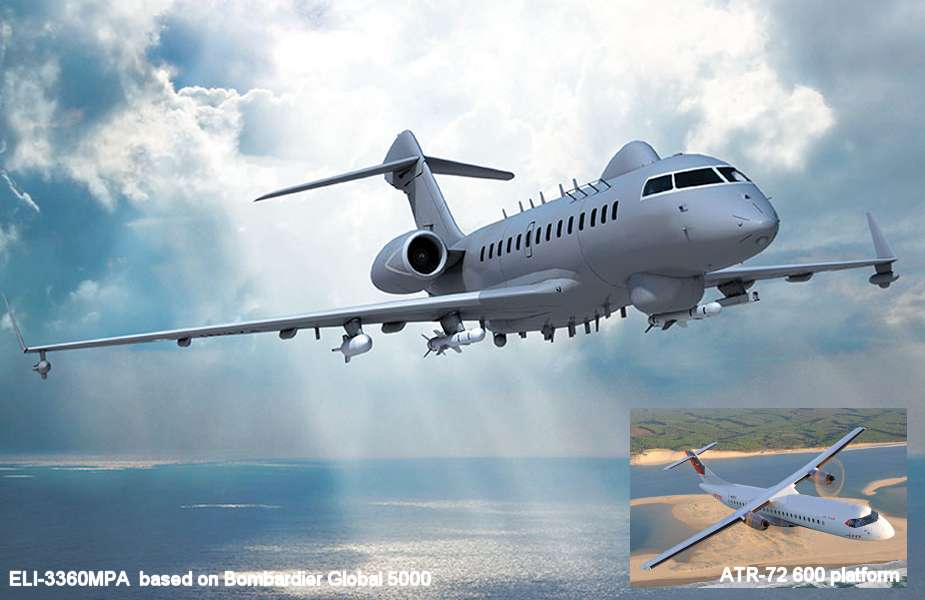Breaking news
Israeli Elbit System to enhance Philippines Navy with next-generation Maritime Patrol Aircraft.
The Philippine Air Force has launched the $114 million Long Range Patrol Aircraft (LRPA) Acquisition Project. This vital initiative is part of the Horizon 1 phase of the Revised Armed Forces of the Philippines Modernization Program (RAFPMP), marking a key advancement in the nation's defense capabilities. The LRPA project has seen two main contenders emerge: the ELI-3360MPA on an ATR-72 600 platform and the Airbus P-295MPA / ASW.
Follow Navy Recognition on Google News at this link
 The Philippine Air Force will significantly enhance its capability to monitor its exclusive economic zone and territorial areas in the South China Sea with the Elbit long-range patrol aircraft, which are based on the Leonardo ATR 72-600 platform. (Picture source: Elbit System and Wikimedia)
The Philippine Air Force will significantly enhance its capability to monitor its exclusive economic zone and territorial areas in the South China Sea with the Elbit long-range patrol aircraft, which are based on the Leonardo ATR 72-600 platform. (Picture source: Elbit System and Wikimedia)
With an Approved Budget for the Contract (ABC) set at $114 million, the project initially plans to procure two maritime patrol aircraft. These aircraft are aimed at strengthening the 300th Air Intelligence and Security Wing of the Philippine Air Force, significantly enhancing the nation's maritime surveillance and intelligence-gathering abilities.
The funding for this ambitious project is sourced from the AFP Modernization Fund, supported by a Multi-Year Contractual Allocation (MYCA) through the General Appropriations Act (GAA) starting in the fiscal year 2021. Notably, three Special Allotment Release Orders (SARO) have been issued to financially back the project. These include a 15% initial payment of approximately $17.03 million (PHP 896.4 million), a revalidation of the previous unused SARO, and a substantial 40% second-stage payment.
Following rigorous negotiations and evaluations, Israel's Elbit Systems has been declared the winning proponent for this project. While the exact product to be delivered remains to be confirmed, the ELI-3360MPA on an ATR-72 platform is highly likely to be the selected model. This choice underscores the Philippine Air Force's commitment to incorporating advanced technology into its fleet.
The acquisition process, pending a final decision on its modality, will most likely be a government-to-government (G2G) arrangement with the Israeli Ministry of Defense. This procurement method is expected to facilitate a smoother and more efficient procurement process.
First made public in May 2015, the project has undergone various development stages. Currently, the project has been restarted with initial funding released in 2021. Elbit Systems was selected as the primary proponent after being shortlisted along with IAI-Elta and Elbit Systems-Elisra. Following the notice of award to Elbit Systems in November 2022 and subsequent amendments in January 2023, the project is now at an advanced stage of realization.
The delivery of the two LRPA aircraft will be carried out over five years. The Philippines will benefit from ongoing support, training, and maintenance services to optimize the performance and longevity of the aircraft and its mission suite.
The Department of National Defense and the Armed Forces of the Philippines (DND-AFP) have refrained from revealing specific details about the avionics and specialized systems to be installed in the aircraft for the LRPA project, citing national security concerns. However, in a statement released on 10 July, Elbit Systems shed some light on the capabilities of their ATR 72-600-based special missions aircraft. According to Elbit, this aircraft will be equipped with a sophisticated Mission Management System (MMS), advanced radar systems, electro-optics (EO), Signals Intelligence (SIGINT) capabilities, and comprehensive communication systems.
These features align with the Philippine Air Force's (PAF's) initial 2014 requirements for the LRPA. The PAF's criteria included at least four multifunction consoles with an airborne tactical system incorporating an integrated Electro-Optical/Infrared (EO/IR) turret. Furthermore, the requirements called for enhanced surveillance capabilities, including Electronic Intelligence (ELINT) and Communications Intelligence (COMINT) sensors, as well as a Magnetic Anomaly Detector (MAD). These specifications underscore the PAF's focus on acquiring a technologically advanced platform to address a broad spectrum of maritime security challenges.


























